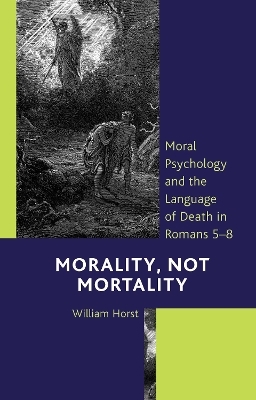
Morality, Not Mortality
Moral Psychology and the Language of Death in Romans 5–8
Seiten
2022
Lexington Books/Fortress Academic (Verlag)
978-1-6669-0028-6 (ISBN)
Lexington Books/Fortress Academic (Verlag)
978-1-6669-0028-6 (ISBN)
This study argues that in Romans 5–8, the present plight of “death” refers to a state of moral bondage in which a person’s will is dominated by passions. It is death of this sort, rather than human mortality or a “cosmic power,” that entered the world through Adam.
This study argues that the language of “death” as a present human plight in Romans 5–8 is best understood against the background of Hellenistic moral-psychological discourse, in which “death” refers to a state of moral bondage in which a person’s rational will is dominated by passions associated with the body. It is death of this sort, rather than human mortality or a cosmic power called “Death,” that entered the world through the transgression of Adam and Eve in Eden. Moral death was imposed on humanity as a judgment against this initial transgression, in order to increase sinful behavior, which ultimately serves to increase the magnitude of the glorious revelation of God’s grace through Jesus Christ. Likewise, creation’s subjection to “corruption” and “futility” in Romans 8 involves the detrimental effects of human moral corruption, not the physical corruption of death and decay. Ultimately, the plight on which Paul focuses much of his attention throughout Rom 5–8 is a matter of morality, not mortality.
This study argues that the language of “death” as a present human plight in Romans 5–8 is best understood against the background of Hellenistic moral-psychological discourse, in which “death” refers to a state of moral bondage in which a person’s rational will is dominated by passions associated with the body. It is death of this sort, rather than human mortality or a cosmic power called “Death,” that entered the world through the transgression of Adam and Eve in Eden. Moral death was imposed on humanity as a judgment against this initial transgression, in order to increase sinful behavior, which ultimately serves to increase the magnitude of the glorious revelation of God’s grace through Jesus Christ. Likewise, creation’s subjection to “corruption” and “futility” in Romans 8 involves the detrimental effects of human moral corruption, not the physical corruption of death and decay. Ultimately, the plight on which Paul focuses much of his attention throughout Rom 5–8 is a matter of morality, not mortality.
William Horst is adjunct instructor at Fuller Theological Seminary and Azusa Pacific University.
Acknowledgments
Abbreviations
Introduction
Chapter 1: Moral Metaphorical Death as a Background to Romans 5–8
Chapter 2: The Language of Death in Romans 6:1–8:13
Chapter 3: The Inception of Death through Adam in Romans 5:12–21
Chapter 4: The Glory of God in the Early Chapters of Romans
Chapter 5: The Subjection of Creation to Corruption in Romans 8:18–23
Chapter 6: Conclusion
Bibliography
About the Author
| Erscheinungsdatum | 11.05.2022 |
|---|---|
| Sprache | englisch |
| Maße | 160 x 227 mm |
| Gewicht | 535 g |
| Themenwelt | Geisteswissenschaften ► Philosophie ► Ethik |
| Religion / Theologie ► Christentum ► Kirchengeschichte | |
| ISBN-10 | 1-6669-0028-1 / 1666900281 |
| ISBN-13 | 978-1-6669-0028-6 / 9781666900286 |
| Zustand | Neuware |
| Haben Sie eine Frage zum Produkt? |
Mehr entdecken
aus dem Bereich
aus dem Bereich
von Athanasius bis Gregor dem Großen
Buch | Softcover (2024)
C.H.Beck (Verlag)
CHF 18,90
mein Leben mit Benedikt XVI.
Buch | Hardcover (2023)
Verlag Herder
CHF 39,90


